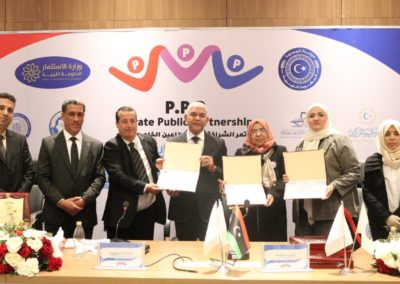Centre’s activities in mid-2023 – PPP Management Conference
On 25 February 2023, in the presence of the Minister of Investment, Mr. Ali Saidi, and current and former officials; The Centre co-organized and succeeded in organizing the Public-Private Partnership Conference under the auspices of the Ministry of Investment led by the Chamber of Commerce, Industry and Agriculture represented by the Chairman of the Preparatory Committee and Salah al-Omrouni… The Directors of the Research Centre of the University of Benghazi “d. Forget Wed. Gaza “, scientific sessions; The Centre ‘ Salem Al-Amami – A. The Elders’ Al-Difar) extracted and compiled recommendations from paper researchers and prepared the final statement of the conference with high professionalism and honored by the Minister of Investment and the Chamber.
Final statement and recommendations
Read by Dr. Salim Al-Emami Head of Training Office, Center for Public Administration and Institutional Development, University of Benghazi
On the 25th of 2023, under the auspices of the Ministry of Investment of the Libyan Government, under the organization of the Benghazi Chamber of Commerce, Industry and Agriculture, and with the cooperation of the Central Bank of Libya, the Centre for Public Administration and Institutional Development of the University of Benghazi and the Centre for Studies, Law and Society, the PPPPPP SE Conference was held in the Ministry of the Economics Hall. Following deliberations over the course of the first and second scientific and professional sessions on topics related to this area of academics, experts, specialists and current and former officials, the Conference concludes with the following recommendations, with the hope that they will be put into practice by the competent authorities of the Libyan Government. The Conference recommends that:
1. Enact uniform legal legislation and accompanying regulations and take advantage of regional and international experiences to enact a modern law that meets the requirements of the national economy and deals with the environmental conditions surrounding it efficiently and effectively.
2. Establishment of a public-private partnership oversight body.
3. Improve the legislative impact of the proposed common system and its impact on the State’s economic, financial and legal policies.
4. Evaluate the private and banking sector with regard to the public and private sector’s ability to finance and manage these projects.
5. Encourage the private sector to provide its initiatives and outputs for the development of the State’s infrastructure by adopting appropriate incentives in the event of the adoption of partnership projects.
6. Initiating a practical model based on the four pillars and criteria: financial capital, human resources and community and knowledge capital.
7. Initiate the drafting of the National Sustainable Development Strategy, which takes into account the depletion of the country’s main natural resource of oil.
8. Choose the appropriate economic model that realizes public-private partnerships and the welfare of society (social market economy).
9. Empower the private sector through an integrated vision for all policy sectors.
10. Improve the business environment and create an environment that attracts investment, internal and external trade.
11. Focus future investment at home to achieve sustainability.
12. Reduce bureaucratic, corruption and quota disadvantages while working on the governance of partnerships between the two sectors.
13. Open doors to all types of financing for direct investment.
14. Focus more on partnership dimension than privatization.
15. Review how funds deposited with the banking sector are used to benefit from and be used for development.
16. Emphasize the importance of the State’s role in overseeing partnership projects and providing a regulatory system to ensure compliance with agreements concluded between the public and private sectors while emphasizing the preservation of the environment.
17. Develop partnership policies that support economic diversification and guarantee a share for SMEs.
18. Inventory of other countries’ successful experiences of partnering with the private sector.
19. Promote dialogue between the public and private sectors.
20. Accelerate the adoption of a structural reform policy for all economic sectors one package in an integrated reform strategy.
21. Emphasize the role of the private sector with its resources, skills, systems and techniques; The public sector through its regulatory actions and the protection of the public interest.
22. Develop a guide to public-private partnerships.
Photo Rights:
Libyan Government Office/Chamber of Commerce/Centre












